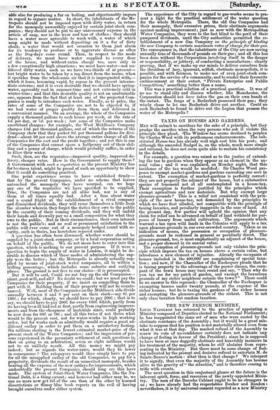TAXES ON HOUSES AND GARDENS.
MEN will submit to sacrifices for the sake of a principle, but they grudge the sacrifice when the very persons who ask it violate the principle they plead. "The Window-tax seems destined to perplex Sir Charles Wood with its posthumous embarrassments. The sub- stituted House-tax has already well nigh cost him his post; and although the amended Budget is, on the whole much more simple and rational, he does not seem quite able to sustain his consistency in the details.
For example, a question was raised as to the justice of extend- ing the tax to gardens when they appear as an element in the an- nual value ; and it was explained on Mondeght, that this incidence of the tax would be modified : Sir Charles Wood pro- poses to exempt market-gardens and gardens exceeding one acre in extent. The exemption of market-gardens is perfectly, correct : they are not properly the adjunct of the house but a substantive species of tenement not at all contemplated in a house-tax. Their exemption is further justified by the principles which exempt agriculture and raw materials. But why exempt large pleasure-grounds? This is a relief not consistent with the prin- ciple of the new house-tax, not demanded by the principles to which we have first alluded, not compatible with the principle of taring luxuries, and peculiarly inapposite in the case of land. At the present day, few parties will uphold the opinion that any claim for relief can be advanced on behalf of land withheld for pur- poses of luxury from useful cultivation. The arguments which warrant a tax upon wild, lands in the Colonies will apply to a tax upon pleasure-grounds in our over-orowded country. Taken as an indication of means, the possession or occupation of pleasure- grounds must be reckoned in general as peculiarly direct. The pleasure-ground, too, is most emphatically an adjunct of the house, and a proper element in its annual value. The exemption of pleasure-grounds not only violates the prin- ciple which imposes the tax on houses above a certain value, but introduces a new element of injustice. Already the occupants of houses included in the 400,000 are complaining of special taxa- tion • and now, if the Chancellor of the Exchequer pleads that he is taxing property to the advantage of the poorer classes, the occu- pant of the town house may turn round and say, "Then why, do you tax me for my patch of garden, and exempt the luxurious grounds of my richer neighbour outside the town?" There could be no answer to this reproach : the Chancellor of the Exchequer is exempting houses under twenty, pounds, at the expense of the richer houses; but he is taxing the gardens of the richer houses and exempting the pleasure-grounds of the richest. This is not only class taxation but random taxation.


























 Previous page
Previous page